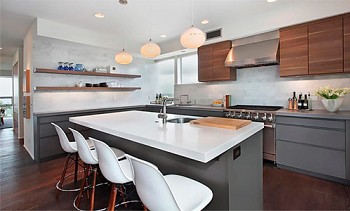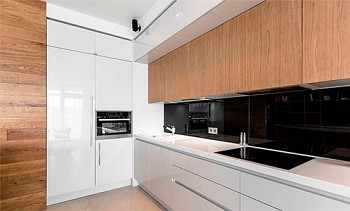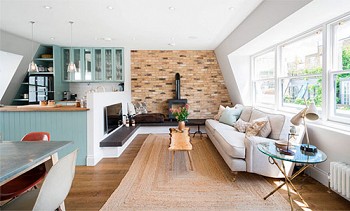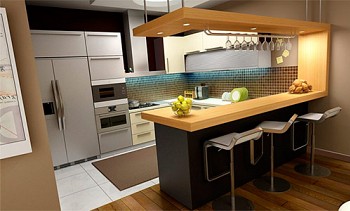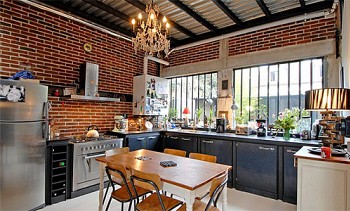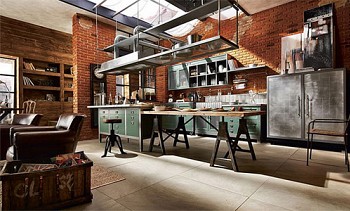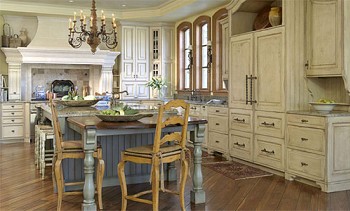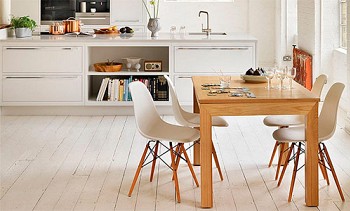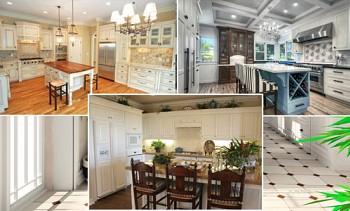Rules for organizing and optimizing the kitchen in Feng Shui
The kitchen has long been considered the heart of the house. Feng Shui attributes it the same status. According to this teaching, cuisine symbolizes health, abundance, and even wealth. It is considered one of the three most important areas of the house (the other two, whether you are surprised or not, are the hallway and the bedroom).
In this article, we will tell you about what the Feng Shui kitchen should look like, the colors that are most suitable for this room, and how to improve the flow of positive qi energy in your modern kitchen.
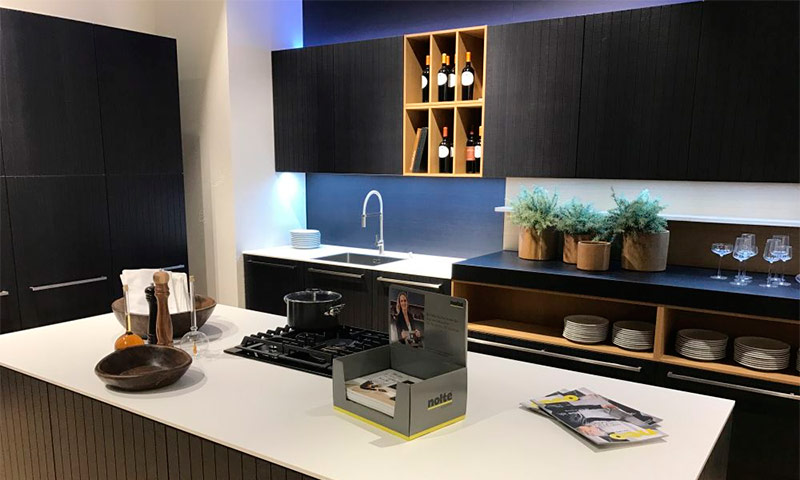
Content:
An excursion into the history of the issue
In ancient times, the Chinese believed that the place where food is prepared is incredibly important for maintaining the safety and health of the residents of the house. Due to the importance of this room, special rules have been established for arranging a Feng Shui kitchen.

Do not forget that the ancient Chinese cooked on an open fire. This meant that the fire pits inside the kitchen area had to be clean and safe, and the kindling and extinguishing of fire required special equipment to preserve the health of the surrounding space. Some of the kitchen-related principles of Feng Shui are associated with these processes.

In modern kitchens, there is no pit for a fire, and, therefore, some of the rules of Feng Shui related to making fire are no longer relevant. In fact, if today we tried to apply all the rules of Feng Shui to our kitchens, it would look meaningless and somewhat superstitious. However, some Feng Shui principles have stood the test of time and can (should!) Be integrated into modern kitchen spaces to increase the health and wealth of home owners.

The colors of the kitchen are Feng Shui. rules
Each person reacts differently to different combinations of colors, so there is no universal approach to choosing a color palette for the kitchen. You should probably focus primarily on those colors that you like, which makes you feel comfortable. Nevertheless, here are a few recommendations for choosing the color of the kitchen in Feng Shui.

Blue
Blue is a complementary color to orange, which is well known to stimulate appetite. It is not surprising that blue has the opposite effect (some believe this is due to the fact that blue food is rarely found in nature).
Using blue allows you to balance the energy of orange. But an overabundance of blue in the kitchen reduces the attractiveness of food: the effect produced may discourage novice cooks and those who like to cook for their loved ones.

Orange (and red)
Orange, like red, increases the attractiveness of food: a person in a kitchen painted in these colors starts eating a lot and often. This may appeal to a novice cook who is trying to make the dishes he cooks to everyone's taste.
However, using too much appetite-boosting orange in the kitchen can cause constant overeating. If you do not want problems, this color is best used in small doses.

The black
In kitchens decorated in accordance with the rules of Feng Shui, they try to avoid black because of the depressing effect of this color and its ability to visually compress the space. Black is very effective, but in the kitchen it can cause a feeling of cold and isolation. In modern black and white kitchen interiors, it is recommended to add contrasting red accents, whether it be a towel, a kettle or even a bowl of red apples on the countertop.

However, Feng Shui still recommends avoiding the black and white color scheme.Better combine black with earthy tones - taupe, tan or even olive. This will reduce the contrast and increase the warmth and friendliness of the kitchen space.
Soft yellow or gold
Along with earthy tones, soft, muted gold and yellow colors work great in the kitchen. They cause a feeling of relaxation and comfort, a sense of security, security and happiness. These colors are associated with fun friendly gatherings and gatherings, and this should be the dream kitchen.

Feng Shui Kitchen Design: Practice
Cooking is an important element of a person’s daily life. The right approach to this process allows him and his family members to flourish in all areas of life. Cooking and cleaning upon completion are ways to demonstrate a person’s desire to take care not only of himself, but also of those he loves.

Tip: Pay attention to the lighting.
The kitchen, as a rule, is the next room after the bathroom in the house where the person goes in the morning, after waking up, so it will be great if this space is as cheerful and sunny as possible. In fact, sunlight directly affects us, stimulating the production of serotonin and melatonin and thereby improving mood.

Some cuisines boast an abundance of natural light. Other cuisines simply do not have this capability. In these cases, it would be useful to install a skylight or even a glass roof.

Tip: Make sure kitchen utensils work well.
This seems obvious, but it is an important part of a well-functioning kitchen. Everything from proper sharpening of kitchen knives to well-closing doors and drawers of kitchen cabinets works together for the good of the whole kitchen. Cracked mugs and cups should be replaced, and chipped paint tinted.

All this is very important for the kitchen. Ensuring the improvement of the kitchen from the point of view of Feng Shui means that a person is able to take care of himself too.

Tip: Be respectful of the stove
As an important symbol of wealth in Feng Shui, the stove requires special respect for itself. Keep it clean and in excellent technical condition. Use all the burners (burners) of the stove in a circular fashion - this will help to evenly distribute energy and introduce positive qi into your space and life.

Tip: Hang a mirror over the stove
Of course, this advice does not apply to all kitchens, but if the space under your hood is dark, Feng Shui recommends hanging a mirror there to reflect the light and heat of the stove. It will be especially useful if the mirror also reflects the kitchen window, doubling it visually!

There is a myth that the mirror in the kitchen in Feng Shui will double the wealth of the house, but you should not hold your breath to expect this to happen in a magical way. There is, however, another advantage of having a mirror behind the stove.
It consists in the fact that the person engaged in cooking will now be in the so-called “team position”, since he will be able to see what is happening behind him. This allows him to feel more comfortable, which from the point of view of Feng Shui is favorable in any space.

Tip: Keep your kitchen clean.
You may not know this, but Feng Shui attaches great importance to cleanliness, especially in rooms that are directly related to health, including in the kitchen. Cleaning the kitchen includes not only wiping the countertops once a day. Kitchen cabinets should be cleaned regularly, both inside and out.
The same goes for household appliances. Every day you need to clean the kitchen apron, walls and countertops. Remember to sweep and mop the floor.

Tip: Keep your kitchen in order.
There is a clear distinction between pure space and space free from clutter, although sometimes these two concepts are combined into a single whole.Kitchen worktops tend to pile up all sorts of elements of a vibrant home life on their surface - mail, brochures, homework notebooks, store receipts, etc. can quickly take up the space needed for cooking.

A good rule is that only those things that are used often (daily or at least three times a week) should be on the countertop. Everything else will look like a mess and therefore should be stored in a closet or closet.

Tip: Keep knives out of sight.
In accordance with Feng Shui, knives make people feel uncomfortable at best, and at worst threatened and vulnerable. And although it is now popular to store knives along the wall on magnetic tape or in a special wooden block, Feng Shui recommends removing them out of sight, for example, storing them in a drawer. Among other things, it’s also safer.

Tip: Do not forget about wooden elements
In modern kitchens, you can easily find fire (stove), water (sink), metal (kitchen utensils and appliances) and earth (color). It remains to imagine the fifth element - a tree. It’s easy: you don’t have to replace your cabinets with wooden ones or something like that.

Turning wood into a kitchen interior is pretty simple. You can, for example, put fruits in a wooden bowl, place a wooden cutting board or block for knives in a visible place (if you still use it, despite our previous advice). Even a small potted plant or just an image of a plant will easily play this role.

Tip: Keep in the kitchen only what you actually use.
The general rule of thumb, widely used in Feng Shui, is that you only need to store the things that you need and / or that you love. (Many interior designers use this rule in their work, regardless of whether they adhere to the principles of Feng Shui or not.)
When cleaning the kitchen regularly, when removing items from cabinets and drawers to wipe them, constantly evaluate whether you are using this item and whether it really is worth continuing to store it in this cabinet. Rarely used items can and should be moved to less accessible storage areas (for example, to the upper shelves of the pantry) or generally discarded.

During the cleaning process, you can also properly organize your kitchen utensils. Your kitchen will become more convenient and your cooking will be more efficient if, for example, you place a toaster next to a bread shelf and a baking dish next to measuring cups and spoons.

Tip: Use large kitchen spaces for eating.
If your kitchen has a large area, you can arrange a dining area here. In this case, you are more likely to find that the best energy flows inside the kitchen. Dining in Feng Shui serves an important purpose, the same goal can be achieved in the kitchen, provided that the latter is large enough to accommodate a separate eating area, which was prepared nearby.

Tip: Avoid large objects above your head.
Pots and pans in some modern kitchens hang from the ceiling, and this has already become a popular design trend. Of course, copper utensils are visually quite attractive and give the kitchen the authentic spirit of a country house, but from the point of view of Feng Shui, this is not very good, because heavy objects placed above our heads tend to make us feel insecure.
In the kitchen, decorated in accordance with the canons of Feng Shui, large pots, pans and other large and heavy objects are stored out of sight - in pantries or kitchen cabinets.

